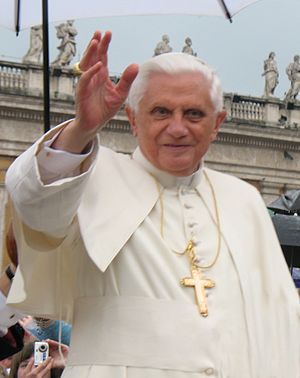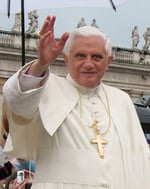Pope Benedict caught the whole world off-guard this morning. At the end of the consistory of the College of Cardinals, he announced his resignation as bishop of Rome, effective on the evening of February 28. It was a true surprise announcement, given the lack of advance leaks and the general consternation that has greeted it. So far the prize for most dramatic headline seems to be the one from the daily Vatican press packet: "Pope Renounces Papal Throne". Which reads like a line from a Medieval history textbook.
As a historian, and one whose work covers part of the Middle Ages, Pope Benedict's resignation was equal parts surprising and fascinating. As one friend of mine put it, the last time something like this happened, a Christian Emperor sat in Constantinople, Christopher Columbus wasn't born yet, and Dante was still writing the Divine Comedy. But to really get at the historical importance of today's headlines, a quick breaking-news church history sketch is in order.
The History of Papal Resignations
There are roughly three relevant historical precedents for Pope Benedict's resignation: Benedict IX (1045), Celestine V (1294), and Gregory XII (1415). Each case was quite the mess, and each presents a different case from today's news and from each other.
Benedict IX was pope near the end of a very turbulent era for the See of Rome. In the early 11th century, two Italian noble families vied for control of the papacy: the Crescentians and the Tusculans. Benedict IX was set up as pope by the Tusculans in 1032. He was, by most accounts, a violent and dissolute man. His resignation in 1045 was part of a revolving-door in his pontificate, where he was forced out (1044), restored (March 1045), resigned irregularly in favor of a relative (May 1045), and managed to resume office (1047) before being deposed for good (1048) at the behest of a very annoyed Emperor. (Check out the Oxford Dictionary of Popes, by J.N.D. Kelly. It manages to give a clear and concise account of that convoluted story.)
Login to read more
Sign in or create a free account to access Subscriber-only content.
Topics:

